 |
After the collapse of the Soviet Union over a decade ago now, a difficult period was, and still is being experienced in many of the countries that formerly comprised it. The effects of Russian expansionist policy in Kazakhstan, Turkmenistan, Azerbaijan, Uzbekistan, Kyrgyzstan and Dagestan have not been erased properly, yet. These countries, which believed that they would be able to establish an order of peace and brotherhood after being liberated from the oppression of the Soviet regime, then found themselves confronted by an altered form of oppression. On the other hand, there is also one nation whose courage and yearning for independence has gone down in history. That land is Chechnya.
 |
The origins of the Muslim Chechens' great struggle against the Russians go back to the late eighteenth century with the capture and subsequent death of Imam Mansur, the legendary resistance fighter, in 1791, at the Russians' hands. In 1816, after the Czar appointed General Yermolov to lead the Russian army, the Chechen people in the northern Caucasus were subjected to terrible slaughter. When the Chechen Muslim leader Imam Hamzat was killed, Sheikh Shamil took over the leadership of the Chechen army, and began the struggle for independence, the details of which have come down from generation to generation right down to the present day.
Sheikh Shamil's armies heroically resisted Russian expansionism for fully a quarter century, from 1834 to 1859. In the end, however, Russia conquered the region, and never again left it.
 |
| Sheikh Shamil's forces heroically resisted the Russian armies and were the predecessors of the Chechen resistance fighters of today. |
There are a number of reasons, historical and economic ones in particular, behind the violent oppression and cruelty that the Chechen people have been exposed to. Chechnya is in fact of far greater importance to Russia than the other Caucasian republics. The region contains considerable energy reserves, especially oil and natural gas. During the Cold War, communist Russia met all its raw material needs very cheaply from that country, and used them to serve itself. After the collapse of the Soviet Union, however, declarations of independence issued by Chechnya – a huge source of raw materials – and the other ex-Soviet republics placed Russia in a terrible quandary.
In addition to the economic factor, Russia's centuries-old policy of expansionism is a historical cause for the disorder currently being experienced in Central Asia and the Caucasus. After the collapse of the Soviet Union, Moscow experienced a short period of uncertainty, but then pulled itself together, and took a number of wide-ranging initiatives to re-establish its influence over the former republics. The first sign of what Russia is at present doing in these republics was given in 1993 in a speech by then President Boris Yeltsin. In this speech, he said that Russia will again win the status of a superpower by regaining all the positions it has lost.6 In other words, Russia refuses to accept these countries' declarations of independence, their winning back their freedom, and their being able to stand on their own two feet. Instead it sees them as "positions to be won back." Of course a country has a perfect right to strive to defend its security, to develop domestic and foreign strategies aimed at establishing economic stength and stability and to strive to be an influential power. It is therefore quite natural for Russia to follow a policy in the light of its own interests. What is wrong and critized here, however, is to use its rights against another community and ruthlessly oppress them for its own power.
Some Muslim communities were unable to win their freedom during the dissolution of the Soviet Union and remained within the Russian federation. One of these, Chechnya, was the main target for that pressure, and for that reason was exposed to great cruelty.
In order to have a correct grasp of what is going on in Chechnya, we need to concentrate on certain points. The war in Chechnya is not the kind of conflict where two sides resort to arms because the conflict between them has reached such a scale that it cannot be resolved by peaceful means, the kind of war that can be encountered anywhere in the world. The justice of the Chechens' demands for independence is being debated in various international circles, and different views are being expressed. Each one of these views is debatable. The matter that everyone is agreed on, however, is that the Russians are behaving with absolutely no restraint and targeting innocent civilians, turning the war from one involving solely the soldiers at the front into an attempt to wipe out the whole population of Chechnya. This is unacceptable, and one of the matters we shall be particularly concentrating on in this chapter.
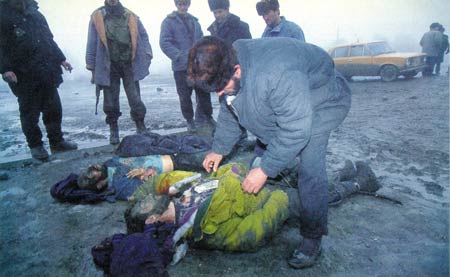 | 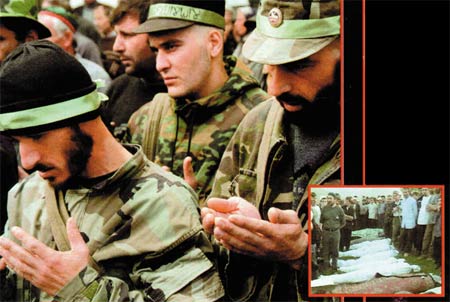 |
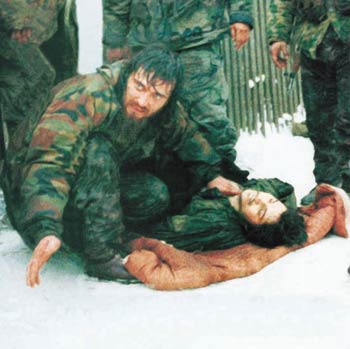 | 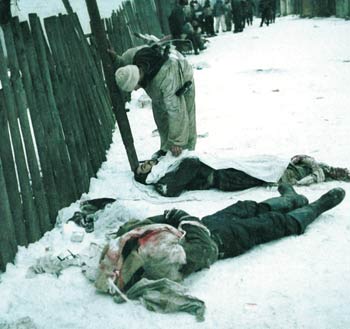 |
| In the 1990s, when the attempts to tear down Chechnya from the inside failed, a policy of savage violence was started. Methods no less terrible than those employed by Stalin and Lenin, which themselves cost millions of lives, were employed. | |
In order to portray itself as in the right in the international arena, Russia suggests that the war in Chechnya is a "domestic matter," believing that it can thus keep the truth of the savagery going on there from the public. Yet that pretext is totally insufficient to account for the way Chechen men are rounded up in the streets and sent off to torture centers, captured prisoners are tied to tanks by their feet and dragged along the ground, babies of cradle age are fired upon and all the people's assets plundered. A great many political scientists and experts are agreed that the Russian administration of the period was practically engaged in genocide in the region and employed the kind of savagery that has seldom before been seen, all in order to keep Chechnya within its own borders.
On the other hand, the attacks by some Chechen circles aimed at Russian civilians also need to be unequivocally condemned. The Chechen people are naturally justified in wishing to live free and honourable lives. Yet actions of that type cast a stain on that justified demand and make it more difficult to defend the Chechen cause. In addition, it must not be forgotten that targeting innocent civilians is a complete violation of Islamic principles. Throughout his life, the Prophet Muhammad (saas) always defended the rights of civilians, even during the fiercest fighting, and ordered all Muslims to be moderate and to avoid all forms of fanaticism. That is what the morality of the Qur'an that Allah requires. In the Qur'an, Allah has commanded Muslims to be forgiving and compassionate and to behave justly, even in war. A Muslim must be someone who first feeds his prisoner even if he himself is hungry, always behaves with moderation even in the middle of a war, defends the rights of the oppressed and never deviates from the path of honesty and justice. For that reason, the Chechen people must never forget Our Lord's stricture "You who believe! Show integrity for the sake of Allah, bearing witness with justice. Do not let hatred for a people incite you into not being just. Be just. That is closer to heedfulness. Allah is aware of what you do." (Surat Al-Ma'ida: 8), even when fighting the oppression that they have been subjected to, and must never, ever target the guiltless and defenceless public.
Our hope is to see a search for a solution to the differences between the Chechens and the Russian administration based on a moderate and peaceful framework, as should also be the case in other regions of the Islamic world.
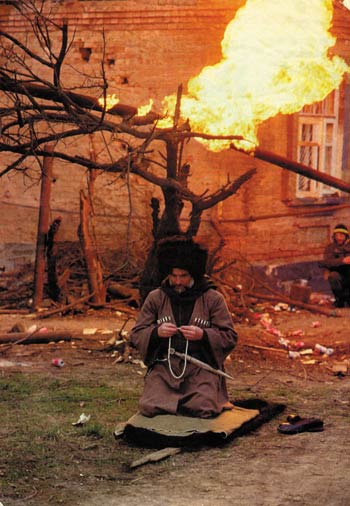 | 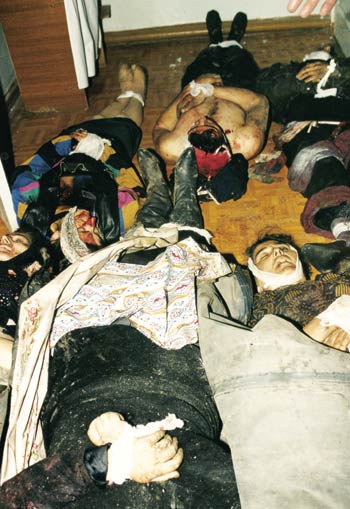 |
 | Those who persecute men and women of the believers, and then do not repent, will have the punishment of Hell, will have the punishment of the burning. |
 |
| Colonialist nations such as Britain, France and Italy inflicted the most terrible tortures on the Muslims living in the Islamic lands they conquered, and carried out mass killings. |
Chechnya, which has been on the world's agenda for the last decade, is a very small country of some 16,000 square kilometers. Within the Russian Federation, there are presently 19 autonomous republics in the same position as Chechnya. These republics make up 28 percent, over one-fourth, of Russian territory. Moscow still has a very strong influence on them, and is very keen that that influence should never be diminished. The loss of Chechnya would mean breaking the stranglehold of Russian power over the other republics, and would result in this nation setting an example to them. If the Chechens, whose total numbers are only that of the troops in the Russian army, break away from Russia, that could spark off independence movements in the other autonomous republics. The most noteworthy characteristic of the republics within the Russian Federation is the way they greatly influence one another, and how a change in one affects all the others.
Alongside all this, there is another element that makes Chechnya important for Russia. The true horror of the communist mentality which is occasionally influential in Moscow, as in the examples of Bosnia and Kosovo, is the establishment of a Muslim state right on its borders. That is the most important reason for the inhuman war waged against Chechnya by the communist mentality, which has tried for years to eliminate the Chechens' religious identity and so inflicted violent oppression on them, demolished mosques, banned worship and prohibited religious education.
The Chechen people are known for their loyalty to their religion, their determination to struggle to be allowed to live by that religion, and for their Islamic identity with its powerful effect on other Islamic states in the Caucasus. The idea of a "United Caucasus," put forward by the aforementioned Imam Mansur in the 1780s, which aimed at uniting the whole of the Caucasus, greatly alarms communist circles. That is because the outstanding feature of such a union would be its being Muslim, and that represents a serious threat to the interests of some evil circles.
The fact is, however, that the presence of Muslims in Chechnya in no way poses a threat to Russia. Russia is one of the countries with the densest Muslim populations, and that Muslim presence is a source of wealth and happiness for it. Muslims who truly live by the moral values of the Qur'an make great contributions to Russia through their moral values, industriousness, moderation and justice. It is no threat to Russia for Muslims to be united and act together in those lands under Russian influence. On the contrary.
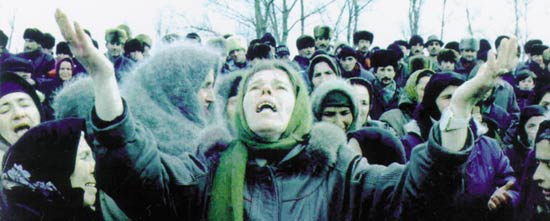 |
The construction of such a union would be the finest guarantee against terror and the most reliable way of securing underground resources, not just for the members of the union but for all the countries in the region, including Russia, and will permit the rapid cultural and economic growth of the whole region. Because the union will not follow a policy against or that excludes any country and will have no intention to put down or interfere in any country. It will not act with a mentality of „as long as we are rich and enjoy well-being, nobody else is of any interest to us." On the contrary, in the same way that it guarantees the security, comfort and peace of every Muslim, so it will protect and watch over the Armenians, the Russians, the Georgians and all other communities.
 |  |
| Chechen Hell | World: Europe Civilian cacualties mount in Chechenya |
 |  |
| Chechenya The Silent Crics | The Fatal Frontier |
| The genocide campaign waged against the defenseless people of Chechnya was reported in the foreign press, yet Western nations did no more than issue toothless condemnations of these actions. | |
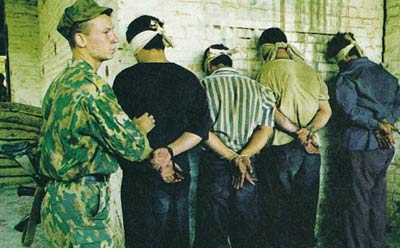 | 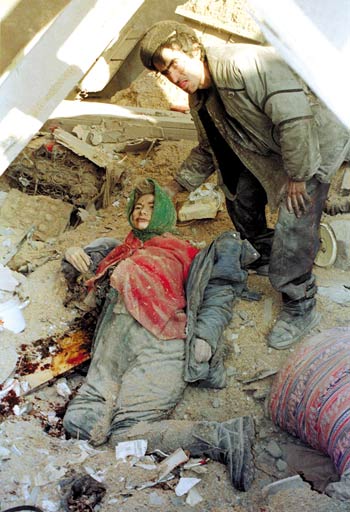 |
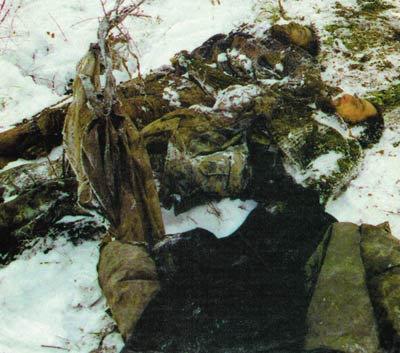 | |
| Russian troops generally aim at civilian targets, bombing markets, maternity clinics and refugee convoys.. | |
| Those who were expelled from their homes without any right, merely for saying, "Our Lord is Allah." If Allah had not driven some people back by means of others, monasteries, churches, synagogues and mosques, where Allah's name is mentioned much, would have been pulled down and destroyed. Allah will certainly help those who help Him. Allah is All-Strong, Almighty) | |
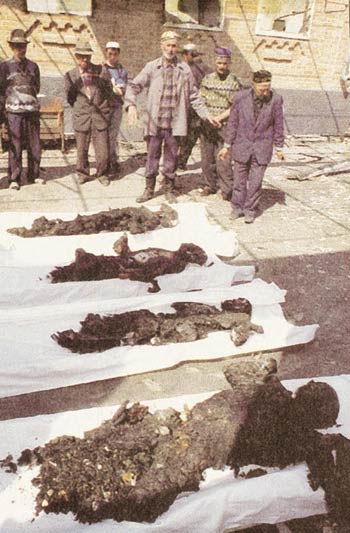 | 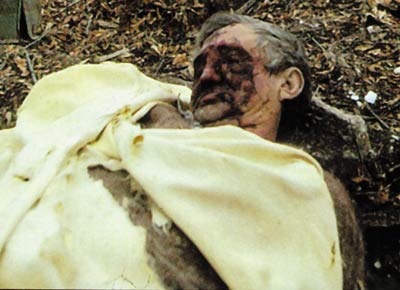 |
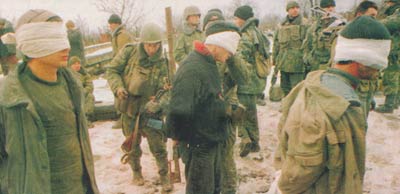 | |
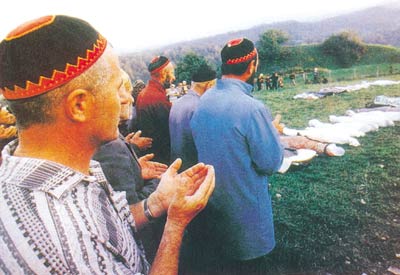 |  |
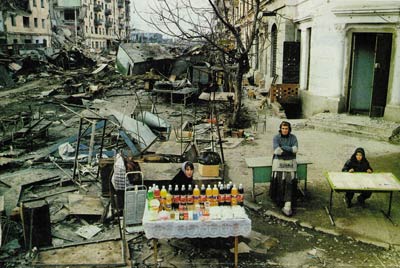 | 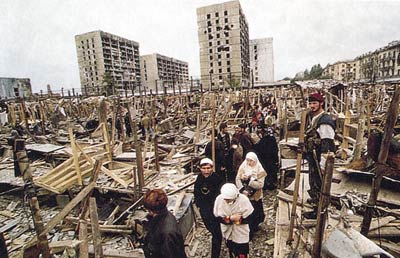 |
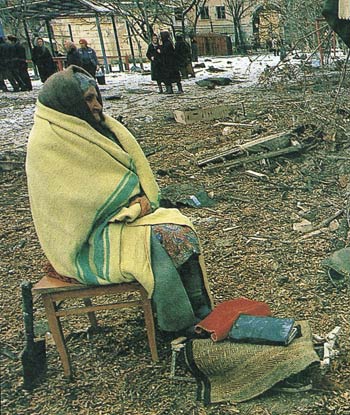 | 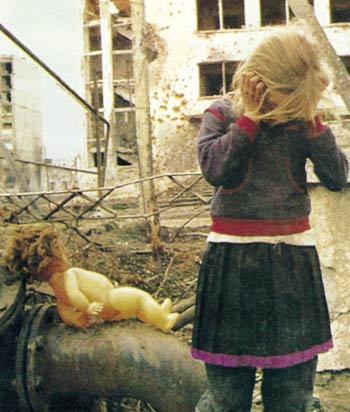 |
| The genocide campaign waged against the defenseless people of Chechnya was reported in the foreign press, yet Western nations did no more than issue toothless condemnations of these actions. | |
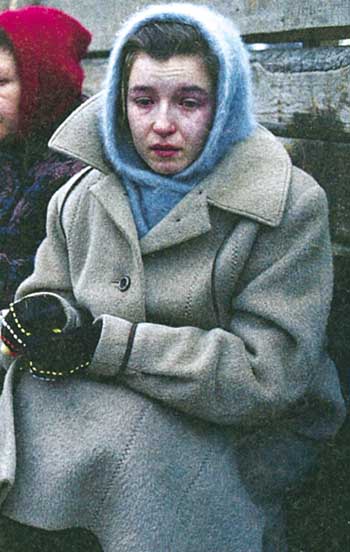 | 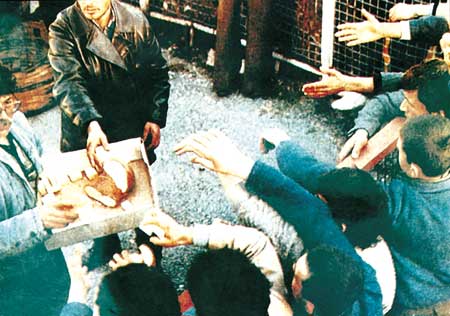 |
|
In the eyes of communist ideology, influenced by Darwin's theory of evolution, society is nothing but a "herd of animals." Man himself is a soulless automaton, lying somewhere between human being, animal and machine. The savagery perpetrated in Chechnya is evidence that reveals all these was carried out under the influence of this ideology. |
It has by now become apparent in many instances that Russia's policies favoring violence over peace have always rebounded against it. However, it needs to be made clear that the Russian administration is not in favor of violence as a single block. It would be wrong to hold the whole Russian administration and people responsible for the repressive policies adopted in Chechnya in the 1990s. That policy of repression and violence is the work of certain circles that have still not abandoned the communist mindset, that stil long for the days of the Politburo and that espouse a superstitious system that literally regards human beings as animals. Under the influence of these circles Russia worked up a secret plan in Chechnya, especially at the start of the 1990s. There were people who thought they could never destroy the Chechens, with their unbreakable unity, by force of arms alone, and so resorted to undermining them from within and tried a number of means of doing so. The communist deep state worked to destroy that popular solidarity and create disorder in Chechnya by interfering in elections, buying politicians, kidnapping and committing acts of terrorism, using pro-Russian clerics to try and stir up religious differences, as well as through economic and political pressure.
However, these methods failed to lead to the success they had expected.
 |
| What reason could you have for not striving in the Way of Allah–for those men, women and children who are oppressed and say, "Our Lord, take us out of this city whose inhabitants are wrongdoers!Give us a protector from You! Give us a helper from You!"? |
Russia's occupation of Chechnya in 1991 was ended by Dzhokhar Dudayev. Then the serious harassment in November 1994 turned into war on December 11 of that year. More than 100,000 Chechens lost their lives in that war, and tens of thousands were forced to flee. The use of banned chemical weapons resulted in a kind of genocide. Furthermore, because Russia had portrayed Chechnya as an "internal matter," no serious reaction came from the outside world. No helping hand except a few European countries was extended to the Chechen people.
The war ended in August 1996 when the Russians admitted defeat. This Chechen success against the Russians deeply affected their fellow republics in the Caucasus. In 1998, the peoples of the northern Caucasus met in the "Northern Caucasus Peoples' Convention" in the Chechen capital, Grozny. All the participating countries agreed on a common position in order to avoid any conflict breaking out between the peoples of the northern Caucasus, and to support each other in the event of a Russian attack. This unity meant the nightmare the communist Russian deep state had feared for so long actually becoming a reality. This was one of the main reasons why a second operation was launched against Chechnya. This time, even more ruthless methods were employed, and inhuman tortures inflicted on defenceless people before the eyes of the world. Yet for some reason, the savagery was generally regarded as a Russian "internal affair."
 |
This second full-scale war between the Chechens and the Russians started when the latter surrounded and bombed a number of villages in Dagestan in the early months of 1999. The 1,500 or so people of these villages asked for help from Chechnya, which they regarded as their natural leader. Shamil Basayev, who had become popular due to his success in war, began to offer assistance to the people of Dagestan in the summer of 1999. Only two of the villages being pounded by the Russians could be saved. There was terrible slaughter in those villages, and innocent people had been viciously murdered. The war between Russia and Chechnyawas sparked off yet again by this incident.
Russian forces entered Chechnya on October 2, 1999 and began to ruthlessly kill anyone they came across, making no exceptions for women, children or the elderly. They began to attack civilian targets. Chemical weapons, Scud missiles and napalm were used in the attacks, and hospitals, maternity wards, public shopping areas and refugee camps were deliberately selected as targets.
 |
 |
One of the forms of attack that the civilian targets experienced was to poison the Argun River, a source of water for the populations of a number of Chechen villages. Most of the women and children who drank from the river died, and hundreds of others were left to suffer long-term ill effects. Chechnya lost three-quarters of its population in just two years. Even now, some of the native Chechens are still trying to survive in neighboring countries under the most difficult conditions.
The massacre of the Chechen people by some Russians who still retain the same old communist mentality resembled the one carried out millennia ago by the Pharaoh. In his own time, he also attacked the weak and defenseless, and brutally slew them. Allah states Pharaoh's cruelty in these terms:
Remember when Musa said to his people, "Remember Allah's blessing to you when He rescued you from the people of Pharaoh. They were inflicting an evil punishment on you, slaughtering your sons and letting your women live. In that there was a terrible trial from your Lord." And when your Lord announced: "If you are grateful, I will certainly give you increase, but if you are ungrateful, My punishment is severe." (Surah Ibrahim: 6-7)
Pharaoh exalted himself arrogantly in the land and divided its people into camps, oppressing one group of them by slaughtering their sons and letting their women live. He was one of the corrupters. (Surat al-Qasas: 4)
The mentality that permits the murder of children, the slitting open of pregnant women's bellies, the crushing old people under tanks and many other atrocities, is far removed from any moral sensitivity, human feelings, compassion, love or sympathy. Many of these people do not even know the reason for the atrocities they carry out, but because of the dark state of the soul that atheism brings with it, they can easily perform all kinds of evil acts. What is expected of Russia is that it should put an end to this dark mentality, left over from the time of the Red Army, which directs its Chechen policy, and for it to adopt a moderate policy that will bring peace and security to both the Russian and Chechen peoples. The hope is that Moscow will abandon its Chechnya policy and this dark mindset left over from the days of the Red Army and that the Russian and Chechnyan peoples will adopt a moderate policy that brings peace and stability.
A number of human rights organizations conducted studies into the Chechen refugees who fled the Russian slaughter, and their reports show violations on an enormous scale. Some 250,000 Chechens who fled the war are now in Ingushetia, and the rest can be found in neighboring regions. Chechens are faced with hunger, thirst and contagious diseases. Women and children, young people and old who were forced to migrate, now try to survive in the freezing cold and rain, two or three families in abandoned train carriages, or in stables in the villages where they have taken refuge.
For example, the Chechens in the Znamenskoye refugee camp to the north of Chechnya are unable to send their children to school because they have no winter clothes. Almost half of those taking shelter there have fallen sick because of the dreadful conditions and freezing cold.7 Diseases such as tuberculosis and hepatitis are spreading among Chechen refugees, who have nothing hot to eat for weeks at a time and whose bodily constitutions are unable to stand up to the conditions. The Death Toll Is Rising.8
Perhaps the most surprising thing is that the majority of the Western nations, which claim to be in the vanguard of the protection of human rights, don't lift a finger to help these people. A significant part of the world's public opinion is not totally aware of the suffering and sometimes insists on ignoring the cruelty inflicted on the hundreds of thousands of Chechens who fled the Russian slaughter. The aid from other countries in the region keeps being cut, and these people who are fighting hunger, thirst and bitter cold are hard put to find even a crust of bread. The terrible plight of these refugees needs to be addressed as a matter of the greatest urgency.
The path to a solution lies in both Russia and the Chechen resistance being called to peace, on the basis of the peace-loving and moderate approach Allah commands. Moscow must abandon regarding the existence and national aspirations of the Muslim peoples of the Caucasus as a threat, and those peoples must reduce the conflict and tension to a minimum by adopting a moderate and peaceful policy. As we have seen in some detail, the Russian terror in Chechnya is unacceptable savagery. On the other hand, however, the Chechen fighters who engage in terror attacks on Russian civilians are also on the wrong path. Both sides must prevent the spilling of any more blood, and make efforts to establish peace.
Extending a helping hand to the Chechen people in the face of the oppression they are suffering is a responsibility of all Muslims in the world. It is clear that nobody with courage who fears Allah and possesses the concept of justice revealed by Him in the Qur'an can stand idly by in the face of this cruelty being visited on innocent people. A true believer always helps the poor, those in need, and those who have been driven from their homes, and will make any sacrifice for them. The self-sacrificing and loving behavior of believers in the Prophet's (saas) time towards those who had been expelled from or had to leave their homes is described thus in the Qur'an:
It is for the poor of the emigrants who were driven from their homes and wealth desiring the favor and the pleasure of Allah and supporting Allah and His Messenger. Such people are the truly sincere.
Those who were already settled in the abode, and in belief, before they came, love those who have emigrated to them and do not find in their hearts any need for what they have been given and prefer them to themselves even if they themselves are needy. It is the people who are safe-guarded from the avarice of their own selves who are successful. (Surat al-Hashr : 8-9)
 |
Naturally, the spread of this superior morality among people is only possible with the dissemination of religion. For that reason, what intelligent people of good conscience need to do as a matter of priority is to find the best ways of communicating the morality of the Qur'an and actually put this into practice. Allah has promised to help those who help His religion:
 |
| Those who were expelled from their homes without any right, merely for saying, "Our Lord is Allah." If Allah had not driven some people back by means of others, monasteries, churches, synagogues and mosques, where Allah's name is mentioned much, would have been pulled down and destroyed. Allah will certainly help those who help Him – Allah is All-Strong, Almighty. |